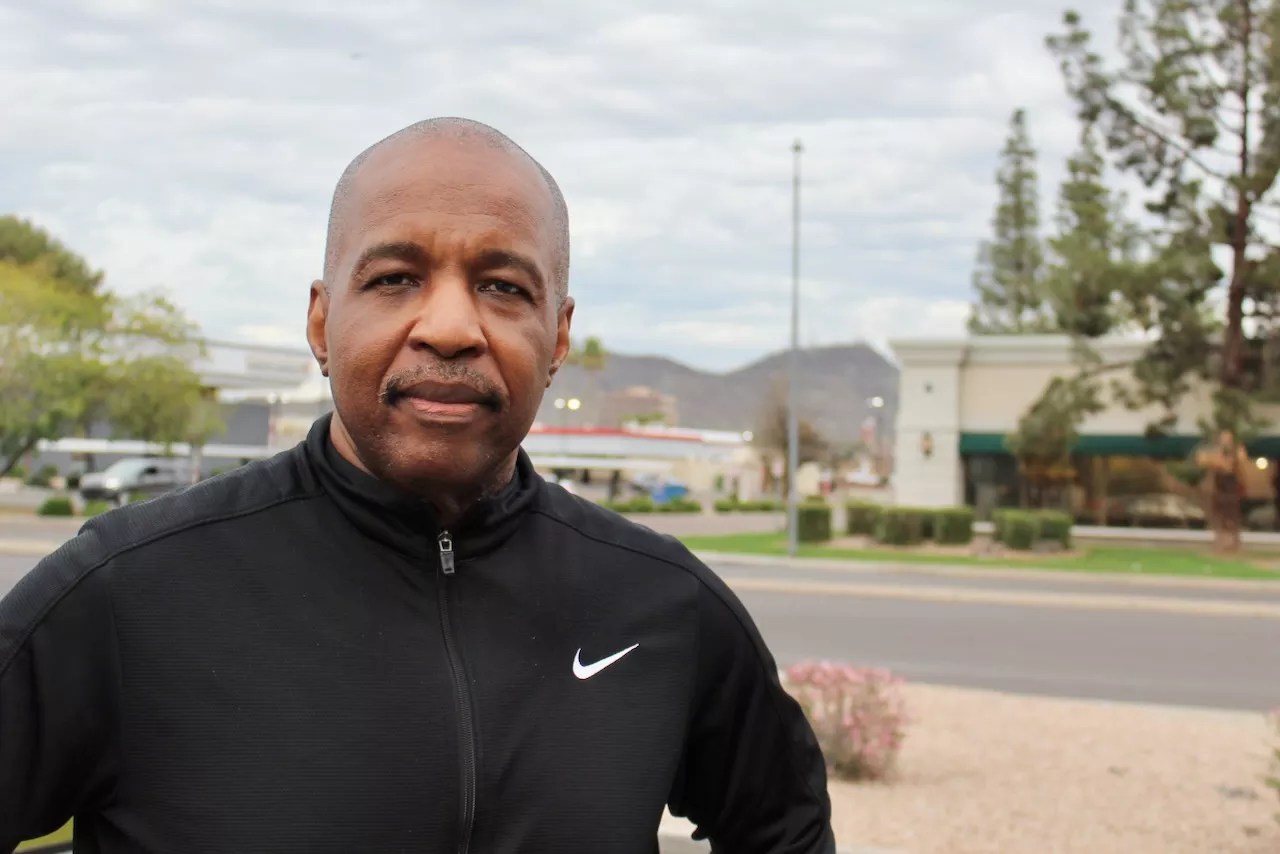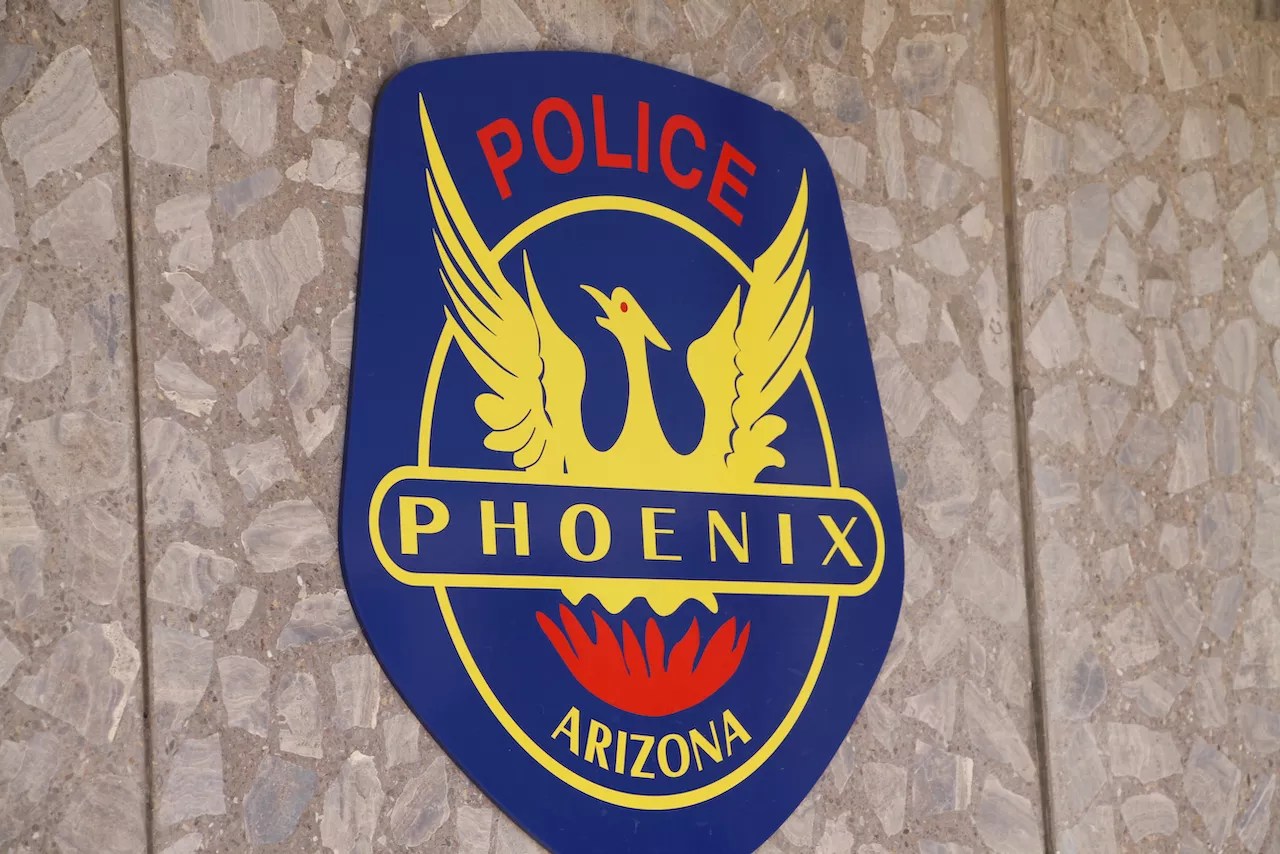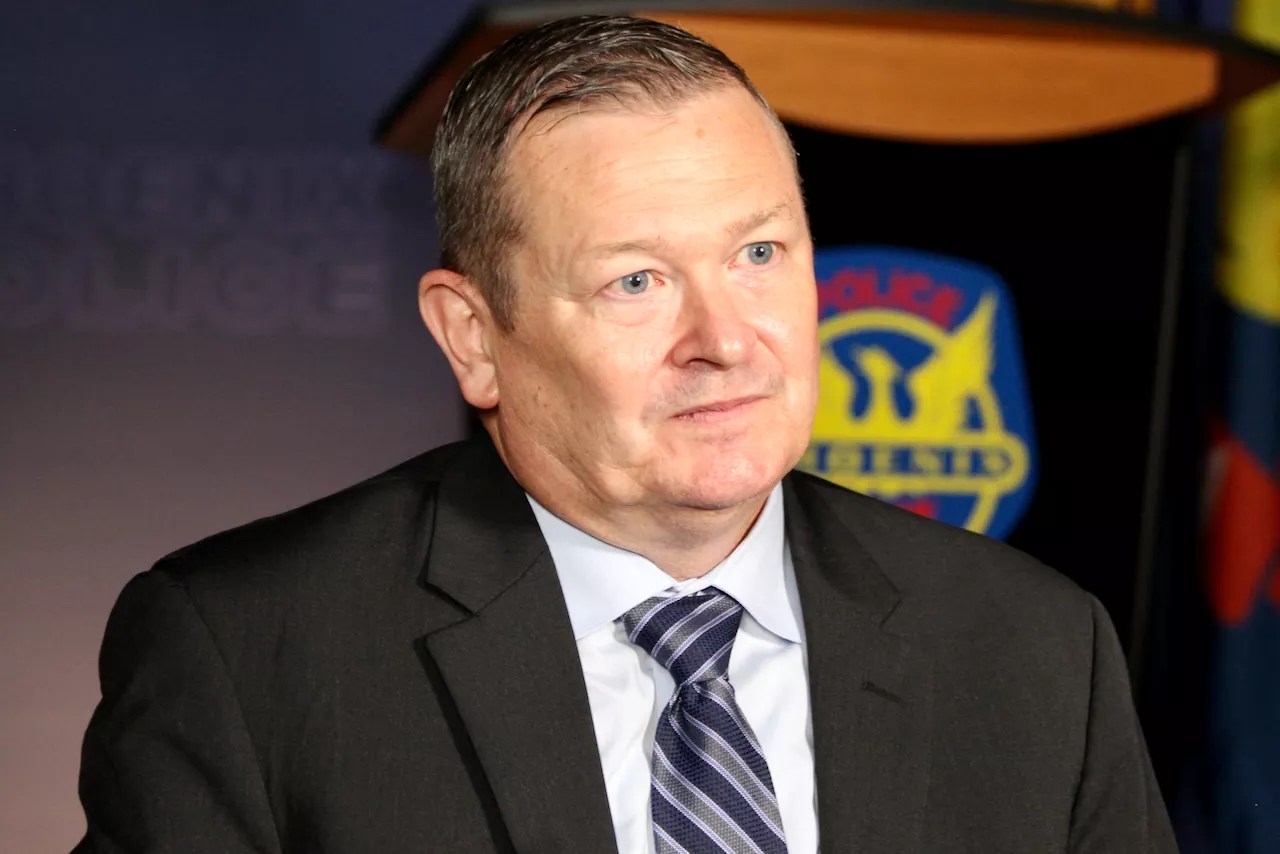
TJ L’Heureux

Audio By Carbonatix
In January, the city of Phoenix began publicly fighting independent oversight of the Phoenix Police Department, claiming its recently created watchdog agency provides “robust, independent, civilian review of the PPD.”
At the same time; however, city officials were working to curb the independence and power of that agency, the Office of Accountability and Transparency, and its director, Roger Smith.
Smith told Phoenix New Times in an interview that OAT made “pretty good, meaningful inroads” with Phoenix police during his tenure. The pushback, Smith said, came from another source.
“The people who have opposed civilian oversight with the most fervor and energy are the City Manager’s Office and the Law Department,” he said.
Documents obtained by New Times suggest that top city officials – including City Manager Jeff Barton, Deputy City Manager Ginger Spencer and City Attorney Julie Kriegh – worked for months to ensure that Smith did not hire Catherine Bowman, the lawyer Smith wanted to serve as his deputy, even after she already had been offered the job.
In the city’s efforts to block Bowman from being hired, a portrait emerges of Phoenix officials’ heavy-handed control over OAT, which Smith led until he left the agency on Feb. 9.
“Events have led me to conclude that OAT does not have the independence required to effectively perform its responsibilities,” Smith wrote in his resignation letter, which he submitted on Jan. 29.
Bowman would have brought 35 years of legal experience, most of it involving policing issues in Arizona, to the accountability office. “That’s a mighty capability to bring to OAT. And that’s why I think they didn’t want her,” Smith said. “They did not want that capability coming into OAT.”
It’s been more than two and a half years since the U.S. Department of Justice began investigating the Phoenix Police Department out of concern that it has engaged systematically in excessive use of force, discriminatory policing, retaliation against protestors and violation of the rights of unsheltered and disabled people.
When the Justice Department finds systemic problems and patterns of misconduct during investigations of police departments across the country, it typically seeks independent oversight to reform the department through a “consent decree,” a type of legally binding performance-improvement plan.
But the city has made it clear it does not want to cooperate with the Justice Department by signing a consent decree, even after city police officers killed more people in 2023 than they did in the previous year.
This is the story of how OAT got declawed and stripped of authority to do what it originally was created to do, and how Smith ended up in a position where he felt as though he had no choice but to leave.

An agency created in 2021 to provide independent oversight of the Phoenix Police Department had its reach limited by state lawmakers and city officials who interfered with hiring.
Matt Hennie
Dumbed down and downgraded
The police oversight agency was created in May 2021 by the Phoenix City Council, three months before the Justice Department stepped in to investigate the police department. In November 2021, Smith was hired following a nationwide search to lead OAT, which was designed to “provide civilian oversight of administrative investigations of misconduct allegations” made against officers, according to the city’s website.
As the first director of the fledgling agency, Smith was tasked with building it from the ground up. Smith, who grew up in New Jersey, previously worked at the New York City Civilian Complaint Review Board, one of the country’s oldest civilian oversight agencies, and then ran a similar agency in Cleveland.
The agencies in New York City and Cleveland have the power to investigate police misconduct instead of merely monitoring the investigations police conduct internally and making recommendations.
Smith told New Times he was excited to lead a new agency through its early days and noticed that the ordinance that established OAT was similar to Cleveland’s ordinance.
While OAT started as an investigative agency, it was weakened in June 2022 after the Arizona State Legislature passed and then-Gov. Doug Ducey signed House Bill 2721. The law prohibits investigations of police misconduct except by organizations whose membership comprises two-thirds certified law enforcement personnel.
In other words, no civilian investigations of police are allowed in Arizona. State Rep. John Kavanagh, the bill’s sponsor, suggested the measure was introduced as a response to the creation of OAT, according to 12News.
The state law neutered Phoenix’s OAT and left it only able to make recommendations about internal investigations conducted by police – and unable to conduct its own investigations.
The city of Phoenix did not challenge the new law, despite its vague language that civilian oversight could not “influence the conduct of” misconduct investigations. This surprised Smith, because the city had previously sued the state – and won – to block implementation of another bill that similarly required police investigations to be carried out by law enforcement personnel.
“If you were looking for an early sign that the attitude wasn’t in favor (of OAT) as much as it looked, it’s when they did not appeal the state bill, despite their own knowledge that the ‘influence’ language in there was vague and open to challenge,” Smith said.
“And by the way, no one has ever made an effort to use that language to restrict OAT’s activities except for the city of Phoenix,” he added.

Ginger Spencer, Phoenix’s deputy city manager, played a key role in blocking the hire of an experienced attorney for the Office of Accountability and Transparency, according to court documents and interviews.
City of Phoenix
City meddling and a made-up timeline
After an application process that began in May 2023, Smith asked Catherine Bowman in September to join the agency and offered her a job as its attorney and the agency’s second-in-command. Bowman would have been Smith’s most important hire, especially considering Bowman’s extensive experience in Arizona policing issues.
But according to a lawsuit Bowman filed on Feb. 7 in Maricopa County Superior Court against the city, Barton, Spencer, Kriegh and Shannon Johanni, interim director of OAT, her Oct. 30 start date was put on hold about three weeks before she was set to begin working.
New Times obtained a copy of a Nov. 8, 2023, email Spencer sent to Smith, Kriegh, Barton – Smith’s boss – and other top city officials in preparation for a meeting the next day about hiring Bowman.
Attached to Spencer’s email was a timeline detailing OAT’s activities since the agency’s inception.
Smith said Spencer did not consult with him about the timeline, despite it concerning the agency he oversaw, and sent it while he was traveling out of state. The timeline, Smith said, contained errors, including that it incorrectly stated that discussions about creating an operational agreement – known as a memorandum of understanding – between OAT and Phoenix police began in October 2022.
New Times obtained a copy of the timeline, as well as a copy of Smith’s calendar from July 2022, which shows a meeting on July 5 titled “Discuss OAT/PD MOU,” along with two other July meetings about the same topic.
Smith told New Times the purpose of the July meeting was to discuss the draft of the memorandum of understanding Smith had provided city officials – three months before Spencer claimed discussions started in her timeline.
Smith told New Times he believes the timeline was created to hide the city Law Department’s involvement in discussions about hiring Bowman. By city code, this hiring of an attorney for OAT shall be “under the jurisdiction” of the OAT director and city manager and not the city attorney.
Smith explained that at the July 5 meeting, Kriegh, who was then chief assistant of the Law Department before later taking its helm, showed up uninvited. She sat next to police Chief Jeri Williams, who eventually resigned in September 2022.
Smith took issue with the way Kriegh handled herself during discussions in the meeting. Smith said he told Kriegh that she was conducting herself as though she were the police chief’s personal attorney, when instead she was supposed to be acting on behalf of the city.
Months later, Smith again raised concern that Kriegh was “representing the Phoenix Police Department’s position” during discussions about the latest draft of the memorandum of understanding.
In a Sept. 19, 2022, email obtained by New Times, Smith wrote to Kriegh and other city officials – including Spencer, Williams, Sullivan and Assistant City Manager Lori Bays – that, “It is disturbing to me that on such an issue, one side (police) should speak through a city attorney.”
Kriegh responded 22 minutes later: “My apologies Roger, I should have just responded to just you. I represent the City.”
All these conversations took place before Spencer’s timeline stated that memorandum of understanding drafts and meetings had begun, Smith said.
After receiving the timeline via email on Nov. 8, Smith said he called Spencer and left a message mentioning that the two needed to talk about the timeline. He said Spencer called him back and left a message saying she was canceling the next day’s meeting, which was supposed to be about Bowman.
“The timeline never came up again,” Smith said.

Phoenix City Manager Jeff Barton is one of the city officials accused of meddling in the hiring of Catherine Bowman, according to a lawsuit.
Matt Hennie
‘They knew they were on shaky legal ground’
Smith said he suspects the purpose of the Nov. 9 meeting that ended up being canceled was for city officials to order him to rescind the job offer to Bowman. A few weeks later, during a Dec. 1 meeting, Smith said Spencer told him he would likely have to rescind the offer to Bowman.
“They knew they were on shaky legal ground, so they wanted me to do it,” Smith said. “I refused.”
“They’re trying to convince me to do it, because if Catherine gets mad and sues, they want to be able to say, ‘It was the OAT director. We had nothing to do with it.’ They didn’t want to take responsibility for it,” he added.
Bowman’s lawsuit argues the hiring decision is up to Smith. She wants a judge to declare that she’s not barred from being employed by OAT and order the city to complete its hiring of her. She wants the judge to rule that the city attorney’s involvement in her hiring violated the city’s conflict-of-interest ordinances and that Barton, Spencer and Kriegh acted outside their legal authority and violated personnel rules.
Dan Wilson, communications director for the city of Phoenix, declined to respond to New Times questions about Bowman’s hiring and the Law Department’s involvement. “This situation is now the subject of legal action, and therefore I cannot provide additional details,” Wilson said.
Bowman also declined to comment when contacted by New Times about her lawsuit.
Time dragged on, and Bowman claimed in her lawsuit that she had not received an update from the city, though Smith told her on Dec. 4 that he was still advocating to hire her.
On Dec. 18, Spencer called Bowman and rescinded the job offer, according to Bowman’s lawsuit. Only afterward was Smith told about the action, according to an affidavit from Smith in the lawsuit.
City officials reached the decision that Bowman could not work for OAT because she had volunteered as a limited reserve police officer – an unpaid volunteer position – for Tucson in the 1980s, according to the city’s response to Bowman’s lawsuit. The city code that created OAT says, “Neither the Director nor any employees in the OAT’s office, nor their immediate family members, shall have formerly been employees of any law enforcement agency.”
Bowman, in a Jan. 1 letter to Mayor Kate Gallego and city councilmembers, pointed out that city officials knew she had volunteered with Tucson police when she submitted her cover letter and resume for the position on May 9, 2023. Yet the city continued the application process, offered her the job and proceeded with salary negotiations and background investigation.
But suddenly, city officials had a problem with her three-decades-old volunteer work just when she was about to start the job with OAT.
In Smith’s affidavit, he wrote that he was told by Spencer during an Oct. 20, 2023, conference call that if he stated in writing that OAT hiring Bowman was his decision and that he was satisfied hiring Bowman did not violate the ordinance, she would support his decision.
In the city’s motion to dismiss the lawsuit on March 15, it added that Bowman could not have been hired because she worked as a legal advisor for the city of Mesa from 2003 to 2009 on matters relating to its police department. Yet that wasn’t an issue during the hiring process. According to Bowman’s lawsuit, “Spencer specifically told Director Smith Plaintiff’s work at Mesa was not disqualifying.”

Mayor Kate Gallego supported the decision of city officials who blocked hiring Catherine Bowman as an attorney for the Office of Accountability and Transparency.
Jaron Quach
‘Sorry this position did not work out’
When Bowman asked Spencer for an explanation in writing, all Spencer sent, according to Bowman’s lawsuit, was a three-sentence message that did not explain the legal reasoning and ended with, “We are sorry this position did not work out.”
Bowman’s letter to the mayor and city council noted that, in the aftermath of her job offer being yanked, she would be “starting the New Year unexpectedly unemployed with tuition and expenses due” for her daughter’s second semester at college.
The council did not respond to Bowman’s letter. Gallego released a statement that Bowman was “qualified” but “did not meet the criteria set forth by the council in the city code.”
Four days after Bowman sent her Jan. 1 letter to the city council, Smith received an eight-page performance improvement plan from Spencer, the deputy city manager.
Spencer’s document is a dressing-down that detailed areas of needed improvement and informed Smith that he needed to “know what battles are worth fighting,” “learn to be less tactless in interpersonal relations” and “ask your boss or a peer to develop a less alienating way to have your point heard.”
The rebuke of Smith came just three and a half months after his September 2023 annual performance review, in which he received high marks: three “exceptional,” four “outstanding” and four “successful” ratings in different categories.
For Smith, Spencer’s improvement plan and the city’s decision to rescind Bowman’s offer were the last straws. He submitted his resignation on Jan. 29.
As the city of Phoenix insists its police department does not need external oversight, all eyes are on the Justice Department’s impending report on patterns of discriminatory policing within the department.
“When DOJ says what it needs to say, I think that will bring a lot of clarity to the situation,” Smith said.

Phoenix police Chief Michael Sullivan called two monitoring reports from the Office of Accountability and Transparency both “insightful and valuable.”
Matt Hennie
A bittersweet farewell
Smith ended his resignation letter by signing off, “With sadness, Roger Smith.”
After Smith’s departure, OAT released its first two monitoring reports on Feb. 22. One of the reports reviewed a Nov. 23, 2022, incident in which police took a Wall Street Journal reporter into custody. The other was about a Dec. 4, 2022, incident in which an officer punched an individual in the face and head multiple times while responding to a call at a Circle K.
OAT concluded that the police’s administrative investigations in both cases were not thorough and complete. The office also provided a range of recommendations, including conducting more follow-up interviews, not carrying out illegal searches and referring incidents to the city’s Critical Incident Review Board, which is separate from OAT. Phoenix police rejected accusations of wrongdoing in the incident.
“The recommendations provided in the first two monitoring reports, released today, are insightful and valuable,” police Chief Michael Sullivan said in a written statement responding to the reports. “I am fully dedicated to fostering a culture of continuous improvement within our department, and I acknowledge the vital role that OAT plays in achieving this goal.”
Wilson, the city’s communications director, disputed Smith’s charges that city officials oppose civilian oversight for the police department.
“The Office of Accountability and Transparency (OAT) has released its first two monitoring reports. The Phoenix Police Department responded with action that will be taken based on those findings. Additional monitoring reports are nearing completion,” he said.
“OAT is actively moving forward with the full support of the City Manager’s office as they fulfill the mission laid out by the Phoenix City Council,” Wilson added.
Smith said that despite the circumstances that led to his resignation, he is pleased that the agency is up and running and staffed with 11 employees. Four positions still need to be filled, according to Wilson.
Still, Smith sees a challenging road ahead for OAT to achieve meaningful change and become the “robust, independent, civilian review of the PPD” the city claims it is.
For OAT to be what it needs to be, “the community is going to have to insist. Because these people (city officials) will do nothing of their own volition,” Smith said.
He added, “They don’t want civilian oversight. They want it even less than the department wants it.”